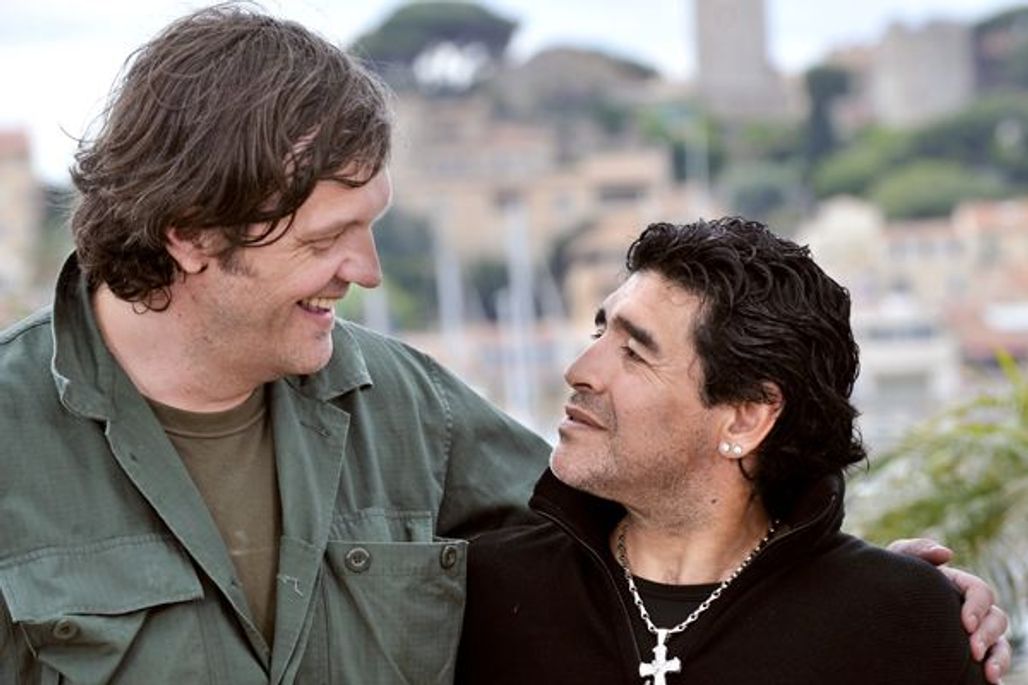
Press Conference: “Maradona by Kusturica”

The two stars of Maradona by Kusturica welcomed the press to the conference room at 3:30 to discuss the film. Excerpts follow:
Diego Maradona, on freedom of speech:
“When you become a well-known figure, you aren’t allowed to talk about the United States or Bush; there’s a whole lot of subjects you’re not allowed to talk about anymore. But Emir gave me the respect that every human being deserves. Even if you’re a football player, you have the right to express your opinions about somebody who’s a murderer. This is why we actually started on this film. This is why we brought this film to birth… What I’m trying to say through the film that Emir has made is that I have my own opinion… and through me, the Argentinian people can express an opinion, in the same way that Emir sometimes expresses the point of view and the way of life of his own country. We aren’t all obliged to think as the Americans do… We all have the right to freedom.”
Diego Maradona, on drug abuse:
“It wasn’t difficult for me to talk about drugs. What is good is that I’ve survived to be able to talk about it here. I can get up every morning, I can talk to my daughters, I can live my life in football or elsewhere in a different way now. I’ve abandoned all those bad habits. Now I have a different life… I’m not living at 100 mph, as I used to. I take it more gently. I enjoy every moment of life.”
Emir Kusturica, on the documentary’s meaning:
“This film is more than my political manifesto… I identify myself politically with the idea of Diego’s meaning around the world. I wanted to project some of the things that I think about the world, but most of the things in this movie came out as common sense. My political statements are much stronger.”
Emir Kusturica, on his friendship with Maradona:
“Philosophically, we are very Dionysian. We are very much into the life in which chaos is part of the stronger energy than rationality… The two of us are not very typical for nowadays, the typical, rational, market-economy philosophy. We are much more back to the ancient times, when Dionysian celebrations were mobilizing most of the aspects of humanity, including chaos as one that keeps your psychological stability.”
Diego Maradona, on the honesty of the film:
“We are both very open to one another. We told one another our stories, and it is on that basis that we were able to make this film… People have said many, many nasty things about me. Only Emir was able to penetrate to my heart, and talk about what I’ve lived through, not only in the good moments, but also in the bad moments of my life… We made this film by opening our hearts to one another. We took advantage of the freedom that we both enjoy, the freedom to say things that many people in the world cannot say… I didn’t like the other films that I’ve seen [about me], because I didn’t have any influence on the films… I didn’t talk to the directors. I didn’t feel concerned by the films. It wasn’t me, myself, who was telling my life story… In Emir’s film, you find all the elements which are essential to understanding who is Maradona, who is Diego, who is his father, who is this football player who took drugs but who managed to escape from the world of drugs. I believe that Emir’s film is really my film… In Emir’s film, nothing is invented. Emir tells things as they are, because it’s my story.”
Emir Kusturica, on his omnipresence on the screen:
“I have a reason for this. There were times when I couldn’t find Diego in Buenos Aires. So without me, this film wouldn’t have been finished.” (laughter)
Emir Kusturica, on other soccer players who fascinate him:
“There is one contemporary player who I consider as one of my heroes. Zinedine Zidane is one of my favorites… I’m not going to make a movie about him, but he impressed me always. His technique is opposite from Diego’s. Diego was the magician who was dribbling, and nobody knew which way he was going.”


